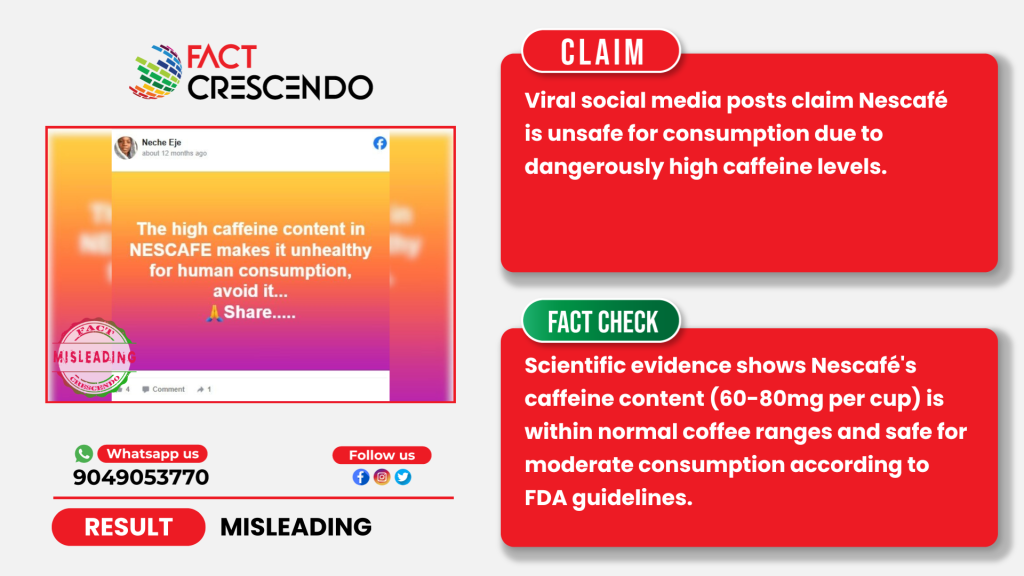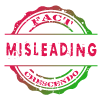
A viral post on social media has generated doubts about Nescafé, warning that its “high caffeine content” makes it unsafe for consumption. Is there any validity in these concerns, or are these only rumours? In this article, we will have a closer look at caffeine’s role in health, how Nescafé compares to other beverages regarding caffeine levels, and the recommended daily caffeine intake for adults. We will also focus on caffeine’s possible benefits and risks and whether caffeine concentrations in Nescafé harm human consumption.
Social Media Posts:
Claim 1: Nescafé`s Caffeine Concentration: How Much Is Too Much?
Like other coffee products, Nescafé contains caffeine. Caffeine is a natural stimulant that can impact the human body. It is also found in coffee, tea, and other products.
Nescafé’s ingredient list can be found here
Nescafé nutrition concentration can be found here
The caffeine content of your Nescafé coffees can be found here
When we consider that an 8 oz cup of Nescafé contains approximately 60-80 mg of caffeine, depending on the type and brewing method. For comparison:
- A standard 8 oz cup of brewed coffee contains roughly 95 mg of caffeine.
- A 12 oz can of Cola contains 34 mg of caffeine.
- A 12 oz can of energy drinks like Red Bull can contain around 80 mg of caffeine.
The concentration of caffeine in Nescafé falls within the normal limits for similar types of drinks. The guidelines of the USA`s National Coffee Association provide more information. Read here
Claim 2: The Recommended Caffeine Intake for Adults
According to the advice of the U.S. Food and Drug Administration (FDA), it is usually considered that most healthy adults should drink up to 400 mg of caffeine per day. This is similar to the following list of drinks.
- Around four 8 oz cups of coffee (or Nescafé)
- Around ten 12 oz cans of cola
- Around five 12 oz energy drinks
However, most people around the globe do not exceed this amount through Nescafé consumption alone. A regular caffeine intake fluctuates well within the FDA’s recommended guidelines for most adults. For more details, refer to the FDA’s official caffeine information.
Claim 3: Potential Health Benefits and Risks of Caffeine
Dr. Damean De Silva, the founding secretary of the Sri Lanka Medical Nutrition Association (SLMNA), explains that while caffeine, sugar, and milk are the essential ingredients in Nescafé, the real concern lies in the sugar content. If a person consumes Nescafé regularly and exceeds the acceptable daily threshold, it could indeed generate a health risk, specifically for individuals who are sensitive to sugar or those who suffer from pre-conditions like diabetes. However, he elaborates that if Nescafé contains animal fats or palm oil as milk fat substitutes, these fats can cause health difficulties if one consumes them excessively over time. Increasing cholesterol levels and the risk of cardiovascular diseases can be generated due to high consumption, as we stated above.
Further, Dr Damean De Silva explained that Nescafé ‘s caffeine content is not harmful when consumed within the acceptable daily intake limits. He emphasised that caffeine does not pose significant risks for most people if consumed in moderate limits. The health concerns related to Nescafé can be linked to excessive sugar consumption and the existence of fats like palm oil rather than the caffeine itself.
Further, if we consume it in moderation, caffeine can temporarily improve cognitive function and reduce fatigue, boosting physical performance by increasing adrenaline levels. Some studies reveal that moderate caffeine consumption may lower the risk of certain conditions, such as Parkinson’s disease and Type 2 diabetes. Read here and here
However, excessive caffeine consumption can generate adverse health effects, including heart-related issues, tiredness, anxiety and jitteriness. Moreover, excessive caffeine intake hurts the human digestive system and food digestion. The sensitivity to caffeine changes from person to person. Some individuals can experience adverse effects at lower doses, while others can tolerate higher levels without health issues.
For a deeper dive into the health impacts of caffeine, read the “What doctors wish patients knew about the impact of caffeine” on the American Medical Association website.
Conclusion:
The viral claim that NESCAFE is unhealthy and should be avoided due to its “high caffeine content” is misleading. NESCAFE does indeed contain caffeine, but its caffeine content is relatively standard and within the safe consumption guidelines set by health regulatory authorities. As long as NESCAFE is consumed in moderation, it is not harmful to most people. Like all caffeinated beverages, excessive consumption can lead to adverse health issues such as anxiety or sleep issues for individuals who are over-sensitive to caffeine.
For most people, NESCAFE is a safe and enjoyable beverage that can be consumed generally without exceeding the limits. If you have concerns about caffeine intake, it’s always a good idea to consult a healthcare provider for personalised advice.

Title:Is Nescafé Unhealthy Due to Its Caffeine Content? Find out the facts.
Fact Check By: Fact Crescendo TeamResult: Misleading


